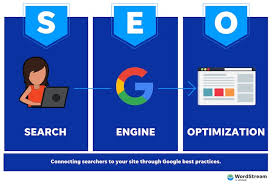
Search Engine Optimization (SEO) is a crucial digital marketing strategy that can significantly impact the visibility and ranking of a website on search engine results pages. In today’s competitive online landscape, having a strong SEO strategy is essential for businesses looking to increase their online presence and attract more organic traffic.
One of the key benefits of SEO is that it helps websites rank higher in search engine results for relevant keywords and phrases. By optimizing website content, meta tags, images, and other elements according to best practices, businesses can improve their chances of appearing at the top of search results when users are looking for products or services related to their industry.
Moreover, SEO not only enhances visibility but also boosts website credibility and trustworthiness. Websites that consistently appear at the top of search results are often perceived as more reputable by users, leading to increased click-through rates and conversions.
Another advantage of SEO is its cost-effectiveness compared to other digital marketing strategies such as pay-per-click advertising. While PPC campaigns require ongoing investment to maintain visibility, well-executed SEO efforts can generate long-term organic traffic without incurring additional costs.
Furthermore, SEO is a dynamic field that requires continuous monitoring and adaptation to stay ahead of algorithm updates and changing user behaviors. By staying informed about industry trends and implementing white-hat SEO techniques, businesses can ensure sustainable growth and success in the digital realm.
In conclusion, Search Engine Optimization is a powerful tool that can propel businesses to new heights in the online world. By investing in an effective SEO strategy, businesses can improve their visibility, credibility, and ultimately drive more valuable traffic to their websites.
Researching and incorporating relevant keywords into your content is a fundamental aspect of effective Search Engine Optimization (SEO). By identifying the keywords and phrases that your target audience is searching for, you can optimize your content to align with their search intent and increase the likelihood of your website appearing in search engine results. Strategic use of keywords not only helps improve visibility but also enhances the overall quality and relevance of your content, making it more valuable to both users and search engines.
Optimizing meta tags, including the title tag and meta description, is a crucial aspect of effective search engine optimization (SEO). The title tag serves as the headline of a webpage in search engine results, influencing click-through rates and conveying the page’s content to users and search engines. On the other hand, the meta description provides a brief summary of the page’s content, enticing users to click through to the website. By crafting compelling and relevant title tags and meta descriptions that incorporate target keywords, businesses can improve their visibility on search engine results pages and attract more qualified organic traffic to their websites.
Creating high-quality, engaging content tailored to your target audience is a fundamental aspect of effective search engine optimization. By producing valuable and relevant content that resonates with your audience’s interests and needs, you not only enhance user experience but also increase the likelihood of attracting organic traffic to your website. Quality content not only helps establish your brand as an authority in your industry but also encourages user engagement, social sharing, and backlinking – all of which are essential for improving search engine rankings and driving sustainable growth for your online presence.
Improving website loading speed is a crucial tip for effective search engine optimization. A fast-loading website not only enhances user experience but also plays a significant role in boosting search engine rankings. When a website loads quickly, users are more likely to stay engaged and explore its content, leading to lower bounce rates and higher conversion rates. Search engines like Google also prioritize websites with faster loading speeds, considering it as a key factor in determining search result rankings. By optimizing website performance through techniques such as image compression, minifying code, and leveraging browser caching, businesses can create a smoother user experience while improving their SEO efforts simultaneously.
When it comes to search engine optimization, optimizing images with descriptive filenames and alt text is a crucial step in improving your website’s visibility and accessibility. By using relevant keywords in image filenames and providing informative alt text descriptions, you not only enhance the user experience for visually impaired visitors but also provide search engines with valuable context about the content of your images. This simple yet effective practice can help boost your website’s SEO performance and contribute to higher rankings in search results.
Building quality backlinks from reputable websites is a crucial aspect of effective search engine optimization. Backlinks from high-authority sites not only drive traffic to your website but also signal to search engines that your content is valuable and trustworthy. By earning backlinks from reputable sources, you can improve your website’s credibility and increase its chances of ranking higher in search engine results pages. Quality backlinks act as endorsements for your content, helping you establish authority in your industry and attract a wider audience. It’s essential to focus on acquiring backlinks from relevant and trustworthy websites to enhance your SEO efforts and boost your online visibility.
Regularly monitoring and analyzing your website’s performance using analytics tools is a critical aspect of effective search engine optimization. By tracking key metrics such as traffic sources, user engagement, bounce rates, and conversion rates, you can gain valuable insights into how your website is performing and identify areas for improvement. Analyzing this data allows you to make informed decisions about your SEO strategy, optimize content for better results, and ultimately enhance the overall user experience on your site. Consistent monitoring and analysis ensure that you stay proactive in addressing any issues that may arise and continue to drive organic traffic to your website.